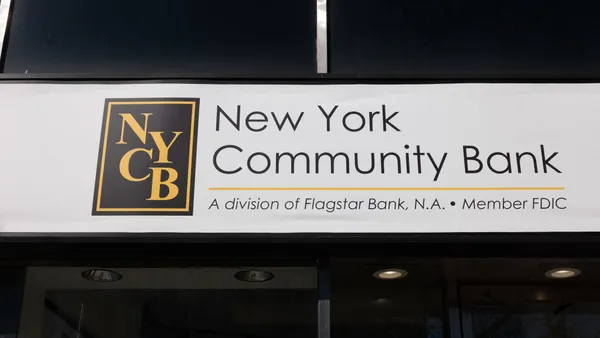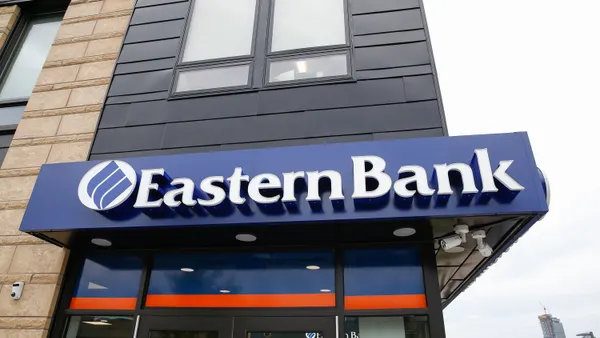Nearly three-and-a-half months after receiving Federal Deposit Insurance Corp. (FDIC) approval to provide deposit insurance, Varo Money closed a $241 million Series D funding round Wednesday as it continues its journey toward becoming a bank.
The Office of the Comptroller of the Currency (OCC) still must approve Varo's national banking charter — a milestone management said in February that it hoped to hit this month, according to The Wall Street Journal. Varo is undergoing a pre-opening examination with the regulator, which means the bank could launch in 60 days or less.
After opening, the 5-year-old startup aims to launch credit cards, loans and additional savings products. The funding will help the company launch a technology platform that will include advanced personalization, predictive insights and "virtual communities" of customers, Varo CEO Colin Walsh told Banking Dive.
"We're going to be operating on a much more modern technology stack, so things will probably feel a little bit different in terms of speed and the way we can interact with customers both through the app, the website [and] through notifications," he said. That tech stack would also be less costly for the company when it operates as a bank.
The Series D capital will also allow Varo to complete its regulatory chartering process. The company declined to offer specifics on the costs of the chartering process, but said it has spent a "considerable sum." American Banker reported in February that Varo spent $100 million to become a bank, a figure the company now claims is "too high."
Varo isn't unique among fintechs and big tech companies seeking U.S. banking licenses. The FDIC approved industrial loan company charters for payment company Square and student loan servicer Nelnet in March. Japanese e-commerce giant Rakuten resubmitted its application for the same type of charter last week. And U.K. challenger bank Monzo applied for a U.S. bank license in April.
While Varo's progress on becoming a bank sets it apart from other U.S. challengers, Walsh said he's unsure others will follow that playbook.
"This is a moat that we've created because it's a high bar to cross from a regulatory perspective, and it’s also a high bar to cross with investors," he said. "It's certainly going to pique the interest of others, but I don't know if, from a regulatory perspective, it's going to get any easier."
Becoming a bank, however, would let Varo roll out products that fintech startups typically don't offer, such as joint and household accounts and wires, complemented by a suite of credit, savings and investment offerings, Walsh said. The company said it also aims to support customers in their quests to become homeowners. Varo offers insurance partnerships in its app and a new funding partnership with Progressive.
While other challengers such as Revolut, Starling and Novo have invested in growing their business banking offerings, Varo — at least for now — is focused on retail customers.
"We see ourselves as clearly building a culturally relevant brand in the banking space, which focuses on helping consumers improve their financial lives and make progress," Walsh said. "There's so many consumers out there that we can help that we don't really feel like we would need to go into a B2B-type business."
Varo likely picked up thousands of retail customers from Moven in April when that company closed its consumer banking accounts. Varo also added two new partners in the past two months: Steady, a financial services app for freelancers; and Wonolo, an on-demand staffing platform.
The company also appears to be riding a wave of growth in digital adoption during the pandemic. New account applications have grown by nearly 70% and deposits are up 300%, Varo said. Fellow challengers Stash and Starling have reported similar upticks. The pandemic has driven a 72% spike in fintech app usage, according to research from financial consultancy deVere Group.
Despite the growth potential, fintechs that become banks could face unforeseen challenges, analysts said.
"When fintech firms start to get starry-eyed at the idea of becoming banks, they forget that the title comes with a hefty amount of regulation and compliance," Zach Anderson Pettet, director of strategic partnerships at Bond Financial Technologies, wrote in PaymentsSource in March. "Unfortunately, most fintech firms just aren't large enough to take on that level of risk or financial commitment."
For its part, Varo hopes to lean on its differentiators. John Popeo, a principal at bank consultancy The Gallatin Group, suggested Varo is uniquely positioned to cater to underserved customers profitably because of its tech advantage over legacy players.
"Challenger banks tend to be less burdened by a lot of the legacy technology and infrastructure that encumbers the traditional banks," he said. "Varo's technology affords them the competitive advantage in how they use the data that they harvest for the benefit of their customers and other parties, and enables them to explore more creative ways to generate non-interest income."











